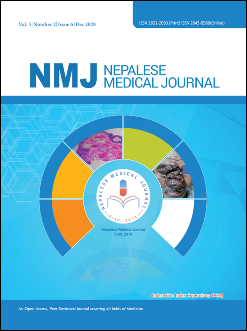Fever of Unknown Origin - A Child With an Unusual Case of Juvenile Idiopathic Arthritis
DOI:
https://doi.org/10.3126/nmj.v4i1.38161Keywords:
Infection; Joint pain; Juvenile Inflammatory arthritisAbstract
Fever of unknown origin in the pediatric population is fever >38.3°C (101°F) of at least seven days' duration, in which no diagnosis is apparent after initial outpatient or hospital evaluation that includes a careful history and physical examination and initial laboratory assessment. Fever of unknown origin is a diagnostic challenge, with a broad spectrum of causes classified as infectious, malignant/neoplastic, rheumatic/inflammatory, and miscellaneous disorders. A high index of suspicion should be kept for juvenile idiopathic arthritis in children presenting with unexplained fever and joint symptoms and should be appropriately managed. The case described here is of a 13-year-old female from Nepal, who presented to the Pediatric outpatient department of KIST Medical College and Teaching Hospital with a history of fever and arthralgia for three months.
Downloads
Downloads
Published
How to Cite
Issue
Section
License
Copyright (c) 2021 Purnima Gyawali

This work is licensed under a Creative Commons Attribution 4.0 International License.
This license enables reusers to distribute, remix, adapt, and build upon the material in any medium or format, so long as attribution is given to the creator. The license allows for commercial use.
Copyright on any article published by Nepalese Medical Journal is retained by the author(s).
Authors grant Nepalese Medical Journal a license to publish the article and identify itself as the original publisher.
Authors also grant any third party the right to use the article freely as long as its integrity is maintained and its original authors, citation details and publisher are identified.




